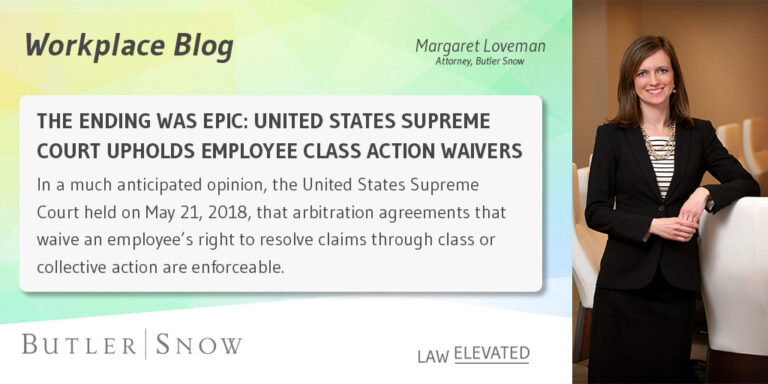In a much anticipated opinion, the United States Supreme Court held on May 21, 2018, that arbitration agreements that waive an employee’s right to resolve claims through class or collective action are enforceable. Epic Systems Corp. v. Lewis, 584 U.S. ___ (2018). In Epic, a compilation of lower court cases from the 5th, 7th, and 9th Circuit Courts of Appeal, the employees entered into employment agreements that contained provisions consenting to arbitrate any disputes. The terms of the arbitration agreements required “one-on-one arbitration.” It did not allow for class or collective proceedings to resolve employment disputes. Despite these provisions, employees sought to file class or collective action claims in federal court.
The Federal Arbitration Act contains a “savings clause” that invalidates any arbitration agreement that violates another federal law. The employees in Epic grabbed hold of this clause and argued that their arbitration agreements were not valid because they violated another federal law—the National Labor Relations Act (‘NLRA”). They argued that denying an employee the opportunity to collectively litigate a dispute violated the NLRA’s prohibition against contracts that deny employees the right to engage in “concerted activities.” The employers disagreed. They argued that class and collective actions were not “concerted activities.”
In a 5-4 split down ideological lines, the United States Supreme Court sided with the employers. In an opinion written by Justice Gorsuch, the majority of the Court found that “as a matter of law the answer [was] clear”—under the “Federal Arbitration Act, Congress has instructed federal courts to enforce arbitration agreements according to their terms — including terms providing for individualized proceedings.”
So what does this mean for employers? Fewer wage and hour claims. Wage and hour claims are notoriously expensive to litigate and individually offer little reward. Collectively, however, wage and hour claims can offer a larger return on investment, which is why many attorneys representing individual employees shy away from single-plaintiff cases. As Justice Ginsberg wrote in her dissent, without the ability for employees to bring these actions collectively, arbitrating individual claims will be too expensive to pursue. As a consequence of this opinion, employers should consider consulting with their legal counsel about drafting employment agreements in which employees waive their right to pursue class or collective claims.
Authored by: Margaret H. Loveman
